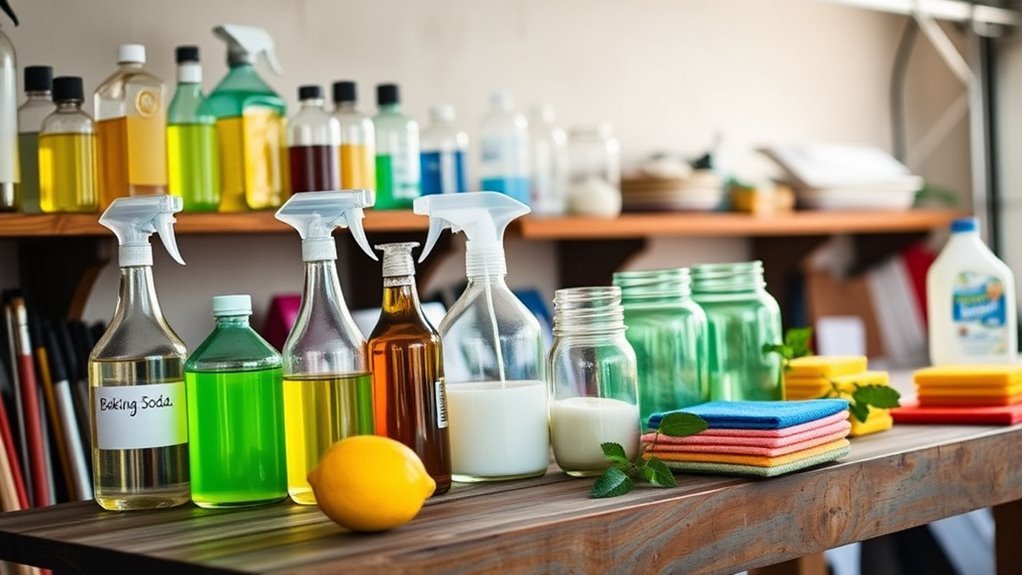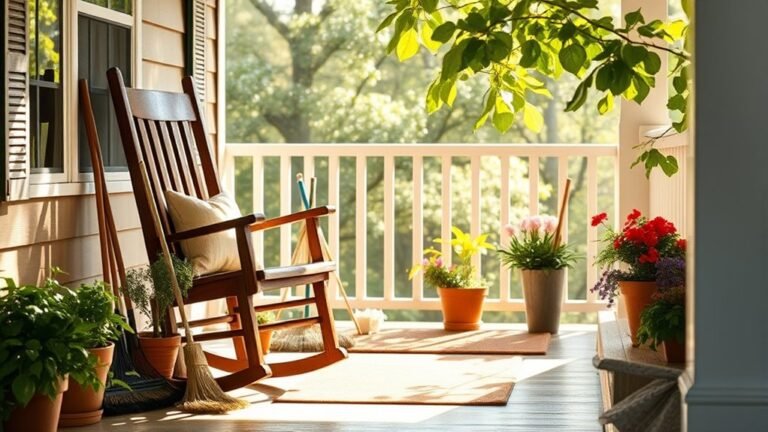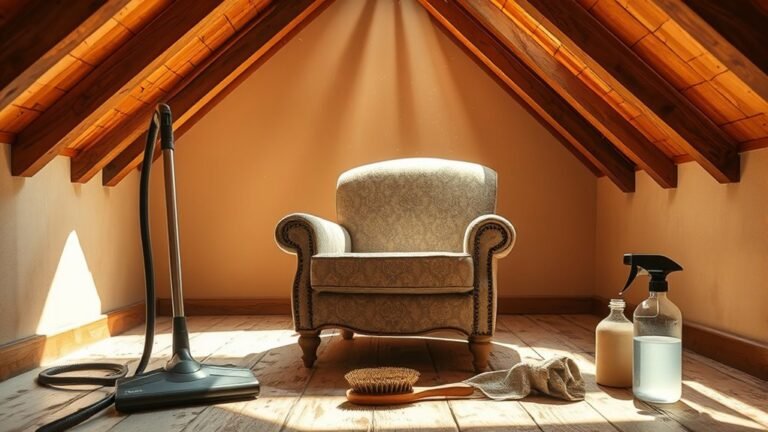Budget-Friendly DIY Cleaning Products for Garage
You can easily whip up budget-friendly DIY cleaners for your garage using common household items. Try mixing equal parts water and white vinegar with baking soda for an all-purpose cleaner. Use dish soap and lemon juice in water to spray away grease. A borax and water solution works great for scrubbing floors, while rubbing alcohol and vinegar make streak-free glass cleaner. Baking soda with essential oils helps neutralize odors. Keep on for tips on tackling rust and more.
All-Purpose Cleaner With Vinegar and Baking Soda
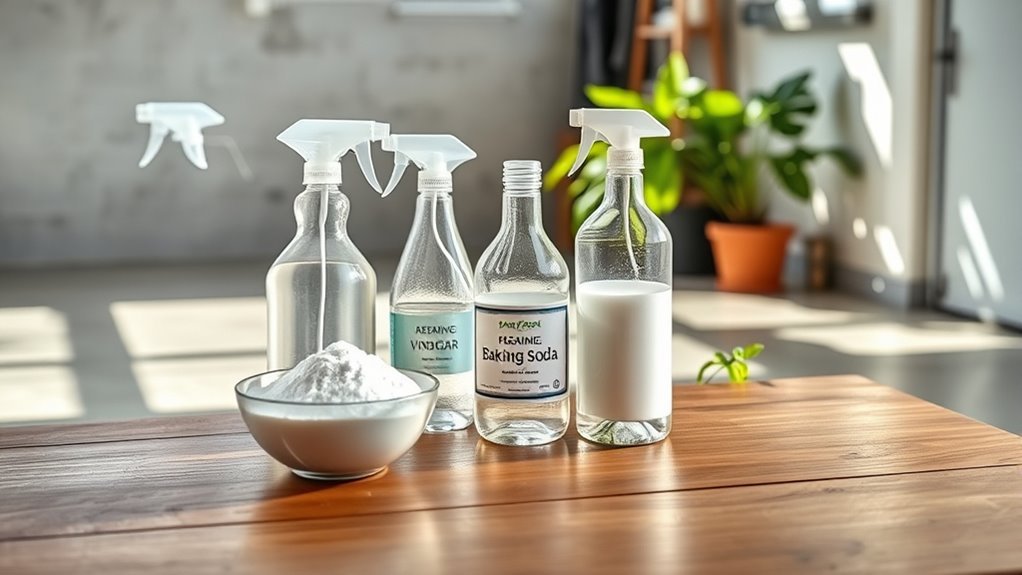
One simple and effective DIY cleaning product you can make for your garage is an all-purpose cleaner using vinegar and baking soda. You’ll love how vinegar benefits your cleaning routine—it naturally cuts through dirt and grime without harsh chemicals. Baking soda adds a gentle scrubbing power while neutralizing odors, making it perfect for tackling stubborn messes. Just mix equal parts water and white vinegar in a spray bottle, then sprinkle baking soda on surfaces before spraying. The fizzing action helps lift dirt, leaving your garage fresh and clean. This combo gives you the freedom to clean safely and affordably, without relying on costly commercial products. Embrace this natural duo, and you’ll enjoy a cleaner space with minimal effort and maximum satisfaction.
Degreasing Spray Using Dish Soap and Lemon Juice
Although grease can be tough to remove, you can easily tackle it with a degreasing spray made from dish soap and lemon juice. The dish soap benefits you by breaking down stubborn grease and grime without harsh chemicals, making your garage cleaning safer and more eco-friendly. Lemon juice properties, like its natural acidity and antibacterial power, boost this spray’s effectiveness while adding a fresh scent. Just mix a few drops of dish soap with the juice of half a lemon in a spray bottle filled with water. Spray it on greasy surfaces, let it sit for a couple of minutes, then wipe clean. This simple, budget-friendly solution gives you the freedom to keep your garage spotless without relying on expensive or toxic products.
Homemade Floor Scrub With Borax and Water
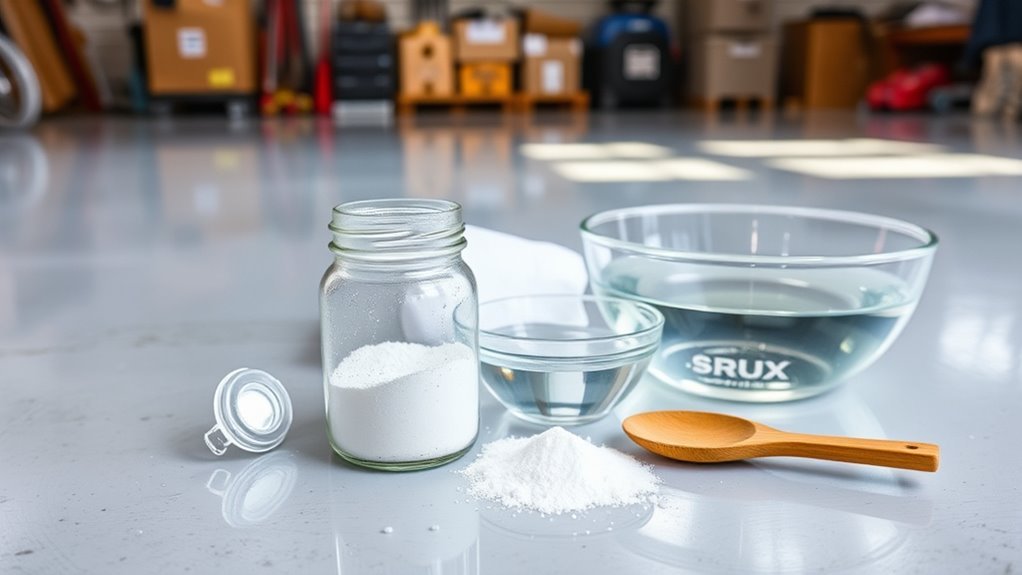
Borax is a powerful and affordable ingredient you can use to make an effective homemade floor scrub. When you mix borax with water, you create a simple solution that tackles dirt and grime without harsh chemicals. This makes it perfect for floor cleaning in your garage, where tough stains often linger. Borax benefits include its natural ability to disinfect, deodorize, and break down stubborn grease and grime, giving you a cleaner surface with less effort. Just combine half a cup of borax with a gallon of warm water, apply with a mop or scrub brush, and watch your garage floors regain their shine. Using this DIY scrub means you control what goes into your cleaner, freeing you from expensive commercial products.
Natural Glass and Mirror Cleaner With Rubbing Alcohol
If you want streak-free glass and mirrors in your garage, a natural cleaner with rubbing alcohol is a quick solution you’ll appreciate. Rubbing alcohol cuts through grime and evaporates fast, leaving surfaces spotless without harsh chemicals. Mix equal parts rubbing alcohol and water in a spray bottle, then add a tablespoon of white vinegar for extra shine. Spray this blend on your glass surfaces, then wipe with a microfiber cloth to avoid lint. This DIY glass cleaning solution is budget-friendly and gives you freedom from expensive, chemical-laden products. Plus, it’s simple to make whenever you need it. With this natural cleaner, your garage mirrors and windows will stay crystal clear, helping you maintain a fresh and open workspace you can be proud of.
Odor Eliminator Using Baking Soda and Essential Oils
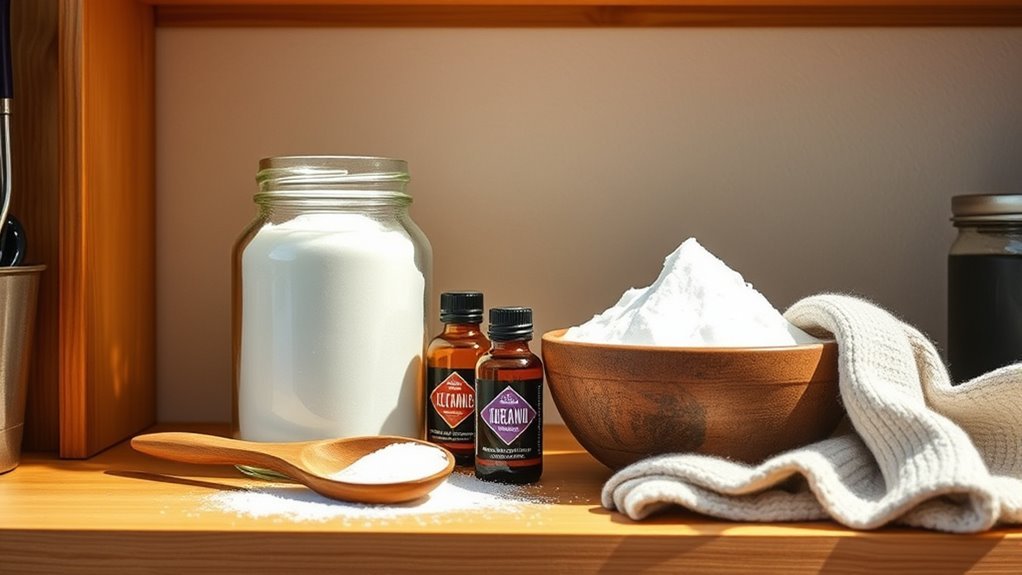
You can easily freshen up your garage with a simple mixture of baking soda and your favorite essential oils. Baking soda absorbs odors while essential oils add a pleasant scent and additional antibacterial properties. Just sprinkle the mixture around or place it in a container to keep your space smelling clean and inviting.
Ingredients and Benefits
Although garages can trap stubborn odors, you can easily freshen the space using baking soda and essential oils. Baking soda acts as a natural deodorizer by absorbing unpleasant smells without harsh chemicals, giving you a safe and effective solution. Essential oils add more than just fragrance—they bring powerful cleaning benefits, including antibacterial and antifungal properties, which help keep your garage environment healthier. Plus, you get to choose scents that match your mood or taste, whether it’s invigorating eucalyptus or calming lavender. Combining these ingredients means you’re using simple, budget-friendly items that respect your desire for freedom from toxic cleaners. This DIY mix not only neutralizes odors but also promotes a cleaner, more inviting garage space, all while keeping it natural and affordable.
How to Use
Combining baking soda and essential oils creates a simple yet powerful odor eliminator that’s easy to use around your garage. To get started, mix one cup of baking soda with 10-15 drops of your favorite essential oil, like lavender or eucalyptus, in a bowl. Stir well to combine. For application methods, sprinkle this mixture onto carpets, shelves, or any smelly surfaces. Let it sit for at least 30 minutes to absorb odors, then sweep or vacuum it up. This straightforward cleaning technique is perfect for freshening your space without harsh chemicals. You can also place the mixture in small breathable bags or containers around the garage for ongoing odor control. Using these methods gives you freedom from unpleasant smells while keeping your cleaning routine natural and budget-friendly.
Rust Remover Crafted From White Vinegar and Aluminum Foil
You can tackle rust in your garage using just white vinegar and aluminum foil. The vinegar breaks down rust naturally, while the foil acts as a gentle scrubber without scratching surfaces. Plus, this method is safe for you and the environment, making it a smart choice for rust removal.
Vinegar’s Rust Removal Power
When tackling rust in your garage, white vinegar becomes an unexpected but effective ally. Its natural acidity breaks down rust without harsh chemicals, giving you a simple, budget-friendly solution. If vinegar isn’t your thing, consider vinegar alternatives like lemon juice or citric acid for similar rust-fighting power. To maximize rust prevention and removal:
- Soak rusty tools in white vinegar for a few hours to loosen corrosion
- Rinse and dry thoroughly to stop rust from returning
- Apply a light coat of oil afterward to create a protective barrier
Aluminum Foil Scrubbing Technique
Building on vinegar’s rust-fighting abilities, pairing it with aluminum foil creates a surprisingly effective scrubbing method. You simply soak the rusty item in white vinegar, then use a crumpled piece of aluminum foil to scrub away the corrosion. This technique takes full advantage of aluminum foil benefits—it’s gentle enough not to damage surfaces but abrasive enough to remove rust. Plus, it’s cheap and readily available, making it perfect for your garage projects. These scrubbing techniques let you reclaim tools and metal parts without harsh chemicals, giving you freedom from expensive cleaners. Just remember, the foil works by reacting with rust, loosening it for easy removal. It’s a smart, budget-friendly way to keep your gear in top shape.
Safe and Eco-Friendly Use
Although many rust removers rely on harsh chemicals, the combination of white vinegar and aluminum foil offers a safe, eco-friendly alternative you can easily make at home. Using eco friendly materials like these helps you protect your garage and the environment while maintaining your freedom from toxic products. To guarantee safe and effective use, keep these points in mind:
- Store your vinegar solution in a labeled, sealed container away from children and pets for safe storage.
- Use aluminum foil pieces only once to prevent contamination and maintain cleaning power.
- Dispose of used vinegar and foil responsibly, avoiding drains to protect waterways.
Häufig gestellte Fragen
How Do I Safely Store Homemade Cleaning Products?
You’ll want to keep your homemade cleaning products in proper containers—preferably airtight and labeled clearly. This helps avoid confusion and spills, giving you freedom from accidents. Store them in a cool, dry place with a stable storage temperature to maintain their effectiveness. Avoid direct sunlight or heat sources, as they can degrade the ingredients. By doing this, you’re ensuring safety while keeping your cleaning routine simple and hassle-free.
Can These DIY Cleaners Damage Garage Surfaces?
You don’t want your garage surfaces melting away like ice cream on a summer sidewalk! When using DIY cleaners, always check cleaning surface compatibility to avoid nasty surprises. Some ingredients might trigger potential chemical reactions, damaging paint, wood, or metal. You’ve got the freedom to clean smart—test a small spot first and avoid harsh acids or abrasives. That way, you keep your garage looking great without risking costly repairs.
Are These Cleaning Products Safe for Pets?
You’ll want to prioritize pet safety by carefully choosing your cleaning ingredients. Natural substances like vinegar, baking soda, and lemon juice are generally safe and less likely to harm your furry friends. Avoid harsh chemicals or anything with ammonia, bleach, or strong fragrances, as these can be toxic. Always rinse surfaces well and keep pets away during cleaning and drying to guarantee your garage stays fresh without putting them at risk.
How Long Do Homemade Cleaners Remain Effective?
Think of homemade cleaners like fresh bread—they’re best when used soon after making. You’ll find their shelf life usually lasts about a week or two, depending on ingredients and storage. Beyond that, their effectiveness duration drops, meaning they won’t clean as powerfully. To keep your freedom intact, store them in airtight containers away from sunlight, and whip up fresh batches regularly to guarantee your space stays sparkling and safe.
Can I Use These Cleaners on Painted Garage Walls?
You can use homemade cleaners on painted garage walls, but you’ll want to take into account the wall materials first. Some cleaning techniques, like gentle wiping or spot cleaning, work best to avoid damaging paint. Avoid harsh scrubbing or abrasive ingredients that might strip or dull the finish. Always test a small, hidden area to make sure your DIY cleaner won’t cause any issues. That way, you keep your walls looking fresh without losing your freedom to choose your own solutions.
